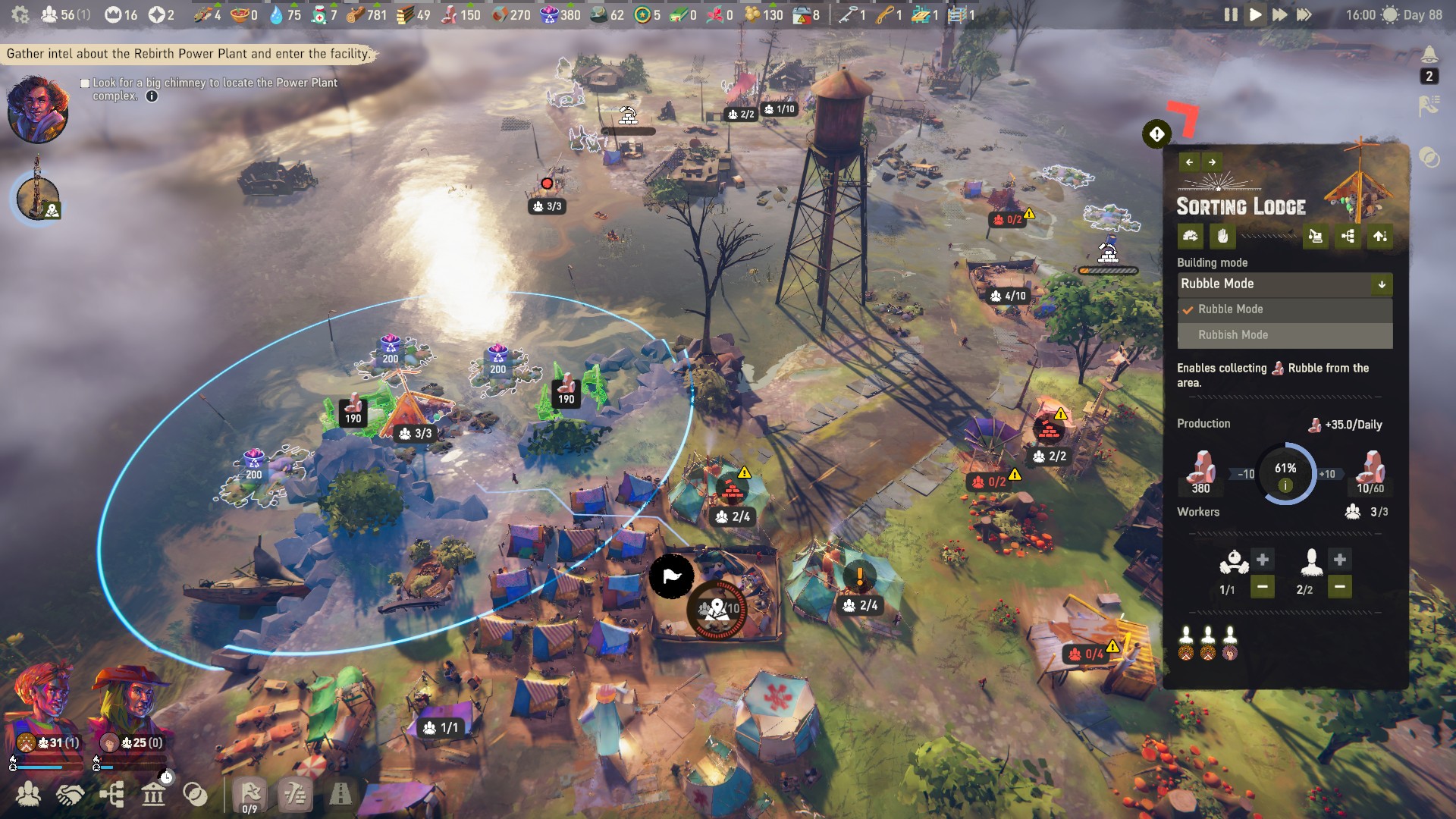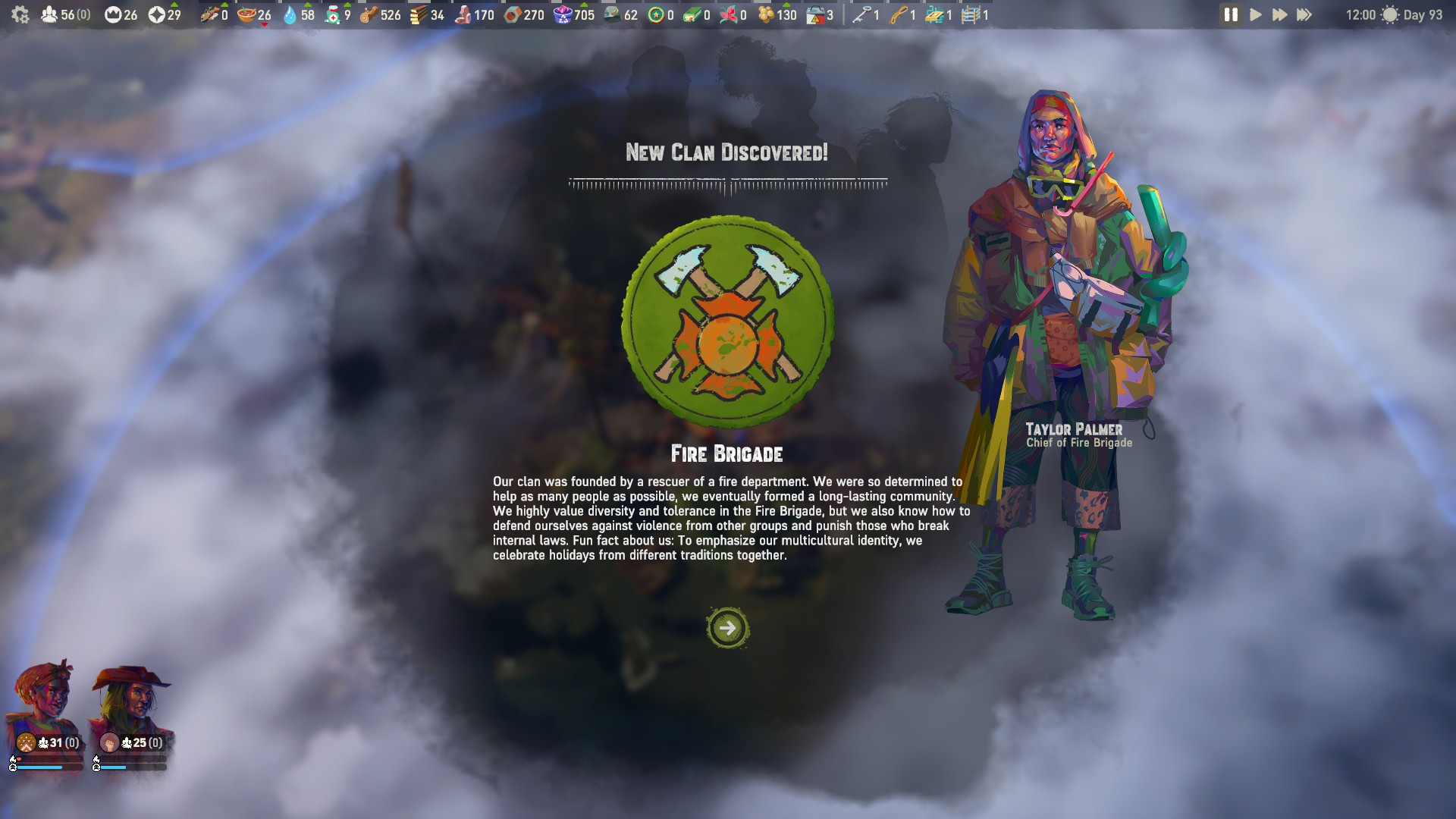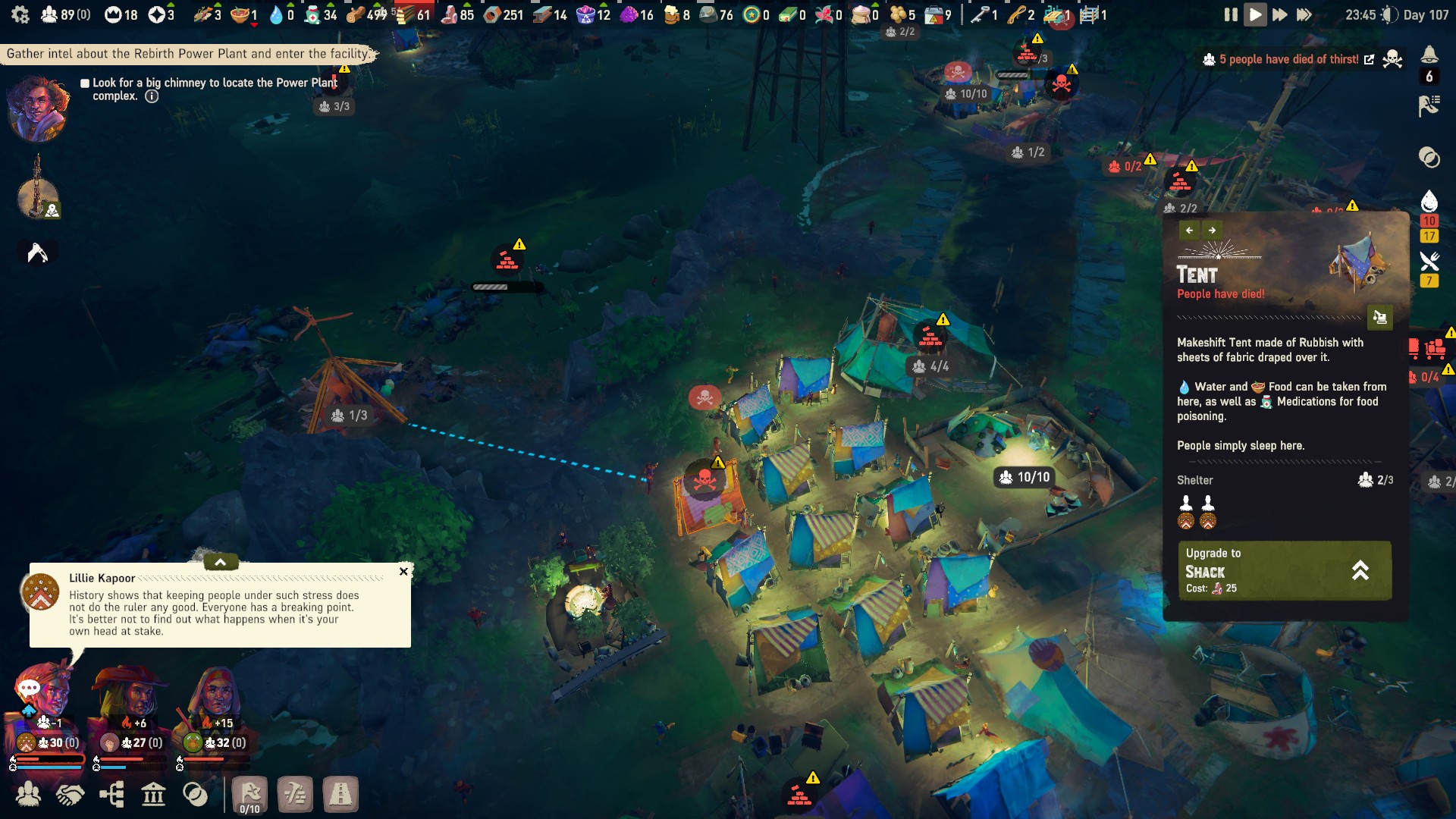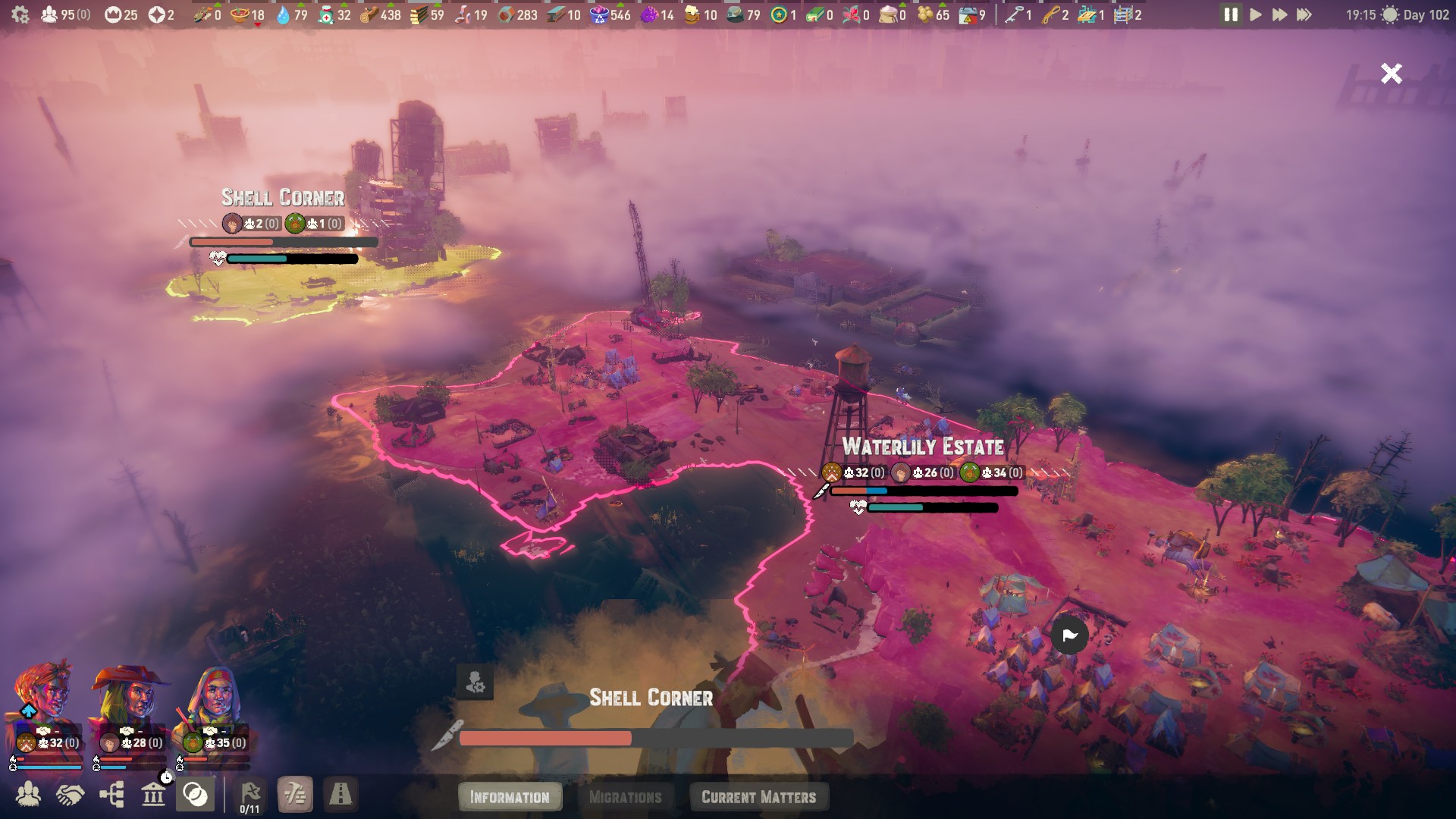Our Verdict
Performance and pacing problems mar an otherwise novel and comprehensive survival city builder.
PC Gamer's got your back
What is it? A survival citybuilder set after the climate change apocalypse.
Expect to pay $30/£25
Developer Vile Monarch
Publisher Ravenscourt
Reviewed on Intel Core i7-10750H, 16GB RAM, GeForce RTX 2060
Multiplayer? No
Link Official site
Floodland, in a lot of ways, is an epilogue to the traditional city builder. Civilisation is in ruins as a result of climate change, and now you have to rebuild with the flotsam and jetsam we left behind. There’s no lush, untouched meadow to stick a motorway on, as in Cities Skylines. There are a lot of smashed-up cars and collapsing houses, rotting boats and wonky skyscrapers. You’ll plunder all of these to rebuild society, for good or ill.
Even before you have set down your first structure, you’ll need to scout the immediate area, sending settlers into the fog of war in search of resources and promising-looking buildings. The most urgent resource is rubbish, which you’ll cobble together into primitive homes, along with job stations so you can put your citizens to work.

It might be a world of scattered islands in the flooded apocalypse of a nameless city, but at the start you’re almost overwhelmed with resources. Build sorting huts to collect the rubbish, fishing docks and field kitchens to supply the camp with risk-free food, and water purifiers to bring in clean drinking water. There’s no radiation to worry about in a game that has a refreshingly hopeful tone—we’ll be alright, after the world ends, if we can manage to work together.
The first brick wall is the survivor count, which you’ll hit almost immediately. There are so many chores to get done—wood to chop and rubbish to gather and endless supplies to ferry hither and thither—and only a handful of settlers to take them on. In many city builders, population increases naturally over time, but here you scour the city for people by dispatching settlers to investigate ruined buildings.
Every band of stragglers added to your settlement is a blessed relief. Phew, that’s ten more pairs of hands to work in the insect hut, and the baker station, and the study to generate research points—but each insists on having a home, food and water. Alas, those bountiful resources don’t last forever.

You’ve plucked that patch of medicinal herbs, and hauled every fish from that stretch of coastline, and while some things will eventually respawn, others won’t. What you should have done is prepare, by researching mills and bakeries and improving your storage depots to hoard more resources, but at some point you will need to expand beyond the borders of the starting island.
You start the game with one clan—it’s fairly easy to get along with yourself—but as more are grafted onto your settlement, tension rises.
Expeditions to other islands devour time and resources, but you’re rewarded with unpicked item heaps, and occasionally even new clans of survivors. These differ from the regular stragglers in that they are more numerous, and have strong, established political identities. Floodland’s central message might be one of unity, but that doesn’t mean it’s easy to implement. You start the game with one clan—it’s fairly easy to get along with yourself—but as more are grafted onto your settlement, tension rises. The Good Neighbors are individualists, while the Oakhill Survivors worship the hierarchy of the world before. Each is represented by a talking head, who will pop up frequently to let you know how badly the clans are getting along.
Anna Brown of the Oakhill Survivors is in favour of public pillories, while the Good Neighbours’ Lillie Kapoor finds the idea horrifying. As you pick one over the other—by passing the law allowing pillories to be built—the objecting clan’s Unrest meter will grow by a chunk. High Unrest leads to crime, though if the squabbling gets too serious you can always move that clan to a new district, on a separate island. This has its upsides—smoother clan relations—but it means you’re spreading your society thinly. A smaller, tighter infrastructure might be more manageable in the long run.

Despite its overall tone of hope, Floodland doesn’t pull any punches when it comes to its survival mechanics, demanding constant micromanagement to keep your people alive and tolerating one another. Rebuilding society is hard work, but ultimately it felt gruelling as I was juggling fish supplies and wood shortages and multiple bickering clans, while having to deal with the glacial pace of technology acquisition.
You begin with basically no clue how to stick two planks of wood together, to make a path, or hurl a fishing line into a body of water, and it’s a long crawl across several tech trees to establish your city. Research points accrue at a measly rate, unless you top them up with one of two currencies earned only through exploration. Though as I said, Expeditions are drawn-out affairs. As in any city builder, while you wait for things to happen your finger will hover over the fast-forward button. Unfortunately, you might want to pull it back.
As my settlement grew larger and more complex, performance began to take a hit. I got used to occasional choppiness, particularly when a lot of working elements were on-screen at the same time, but the framerate would plummet when I activated fast-forward mode. There’s been a hotfix to address performance, though the fast-forward issue remains. In the end, I could only use it in short bursts, and not really do anything else until I switched it off.

But even when it behaves itself, I find it difficult to connect with Floodland. For a game that values people so highly, all you really see of them are the static portraits of a few clan leaders, with the actual settlers being unidentifiable ants ferrying things around. Collapsing a couple of dozen people into the personality of a single clan leader is a sensible idea at this scale, but it makes this a game about squabbling politicians, rather than the little people doing all the work—and I don’t like any of the politicians here very much.
Floodland is an exhaustive (and exhausting) game of survival, expansion and politics. Its exploration element is compelling, and it can be satisfying keeping on top of all the mounting logistics problems. Sadly, with its unlikeable talking heads, it just didn’t give me enough of a reason to care.
Performance and pacing problems mar an otherwise novel and comprehensive survival city builder.
Tom loves exploring in games, whether it’s going the wrong way in a platformer or burgling an apartment in Deus Ex. His favourite game worlds—Stalker, Dark Souls, Thief—have an atmosphere you could wallop with a blackjack. He enjoys horror, adventure, puzzle games and RPGs, and played the Japanese version of Final Fantasy VIII with a translated script he printed off from the internet. Tom has been writing about free games for PC Gamer since 2012. If he were packing for a desert island, he’d take his giant Columbo boxset and a laptop stuffed with PuzzleScript games.



